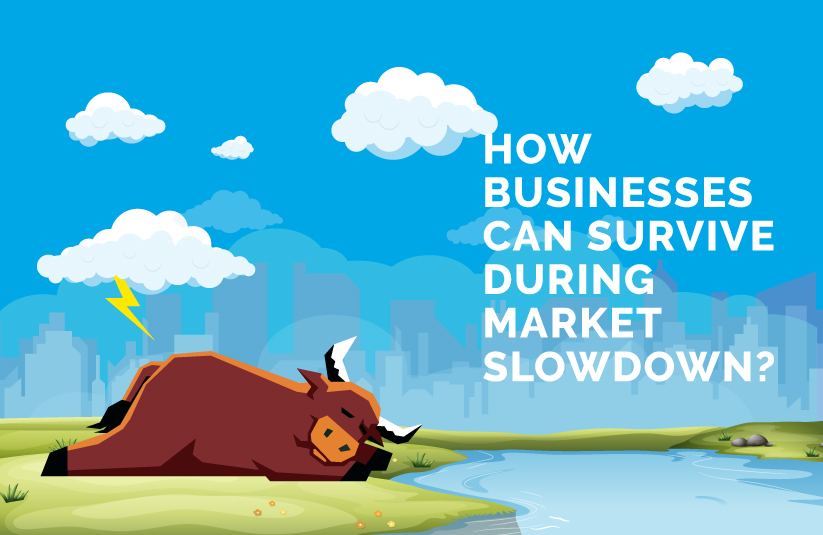Anyone in business will testify that market slowdowns strike with alarming speed nowadays. Understandably, economic downturns, fears of recession and consumer as well as investor sentiments are something that every business worry about because they retard the growth of any business. Indeed, several economic downturns bordering on recession are the cause of giant business companies to roll back expansion plans or downsize market operations.
While these exogenous factors are beyond human control, there’re countless ways how businesses can survive during the market slowdown. In this article, we try to guide you through this intricate process of surviving market slowdowns while maintaining existing clientele essential to keep your business afloat.
Let’s get this clear. There aren’t any magic mantras about how businesses can survive during the market slowdown. It requires intense efforts and diligence on part of businesspersons. Regardless of the nature and size of business.
Here’s let’s explore some time-tested, proven and efficient ways on how businesses can survive during the market slowdown.
1. Innovation Holds the Key
“Every business has two functions- marketing and innovation,” says legendary American investor and philanthropist, Peter F. Drucker. If one decrypts this axiom, it’s apparent that innovation holds the key for businesses to survive during the market slowdown.
Since customers would be reluctant on spending much and hold their money, launch an innovative and economical slew of products and services that are affordable. Indeed, this could prove advantageous in the longer run: an economical range or line means your business can attract a previously unexplored niche of the market- or customers with lower budgets.
2. Never Engage in Price Wars
Unfortunately, price wars or undercutting competitors sounds the death knell for several businesses during the market slowdown. Slashing prices to grab that extra slice of the market is counterproductive and grossly detrimental to your business. Bear in mind that you’ve got to settle dues with suppliers that won’t settle for less merely because your profits are lower.
Nor can you slash staff since that could severely impede the smooth operations of your business. Furthermore, a price war could draw formidable players in the battleground, including those enjoying a better market position and hence have deeper coffers. These rivals can effectively counter your price drop since they would be able to buffer any temporary losses or lower profits.
3. Up the Ante Online
Advertising is a major expense for almost every business, nowadays this is also important even if you’re running that small grocery store. Advertising is a vital component of every business: it creates awareness about your business, brand, product, and services. Hence, lowering your advertising spend sans proper planning can prove disastrous.
Just in case you’re unaware, there’s another excellent way to advertise your business economically and survive market slowdowns. Up the ante online. To do so, you’ll first require an online presence in the form of a website or social media presence.
Instead of conventional offline advertising, step-up digital advertising by deploying various online resources. Google Ads and Facebook Ads are two highly cost-effective ways to advertise your business online at a fraction of the cost of conventional advertising.
4. Open Online Marketplace
You might have a website and possibly taking orders online too. However, it makes good sense to expand businesses to online platforms as well. There’re several excellent platforms where you could open an online marketplace, depending upon the nature of your business. One such platform is Shopify. It’s popular and economical.
You’re expanding the visibility of your business and its offerings by opening an online marketplace. Simultaneously, you’re also reaching a higher number of people that could convert as customers. Another platform is LinkedIn, where you can indirectly advertise products and services if you’re running a Business-to-Business (B2B) operation.
5. Explore Newer Markets
A market slowdown provides an excellent opportunity to venture into previously unexplored geographical areas and develop newer markets. And it’s important as well. A newer market, especially abroad, would be insulated against market slowdowns affecting your existing one. And currency exchange rates would make your business offerings more attractive to foreign buyers.
If you wish to confine operations within your geographical sphere, focus on exploring and developing small domestic markets. Generally, these are more receptive to newer brands and products compared to large markets teeming with countless competitors. Never markets are known to hold any business in good stead when it comes to countering adversities emerging from market slowdown and for future expansions.
It’s worth noting that market slowdowns don’t strike out of the blue: symptoms that a market slowdown is approaching are visible at least a month before they strike. A market slowdown has several triggers. And these triggers would reflect in business news and market trends. Hence, any businessperson has adequate time and opportunities to prepare buffers and plans to counter any adverse impacts.













